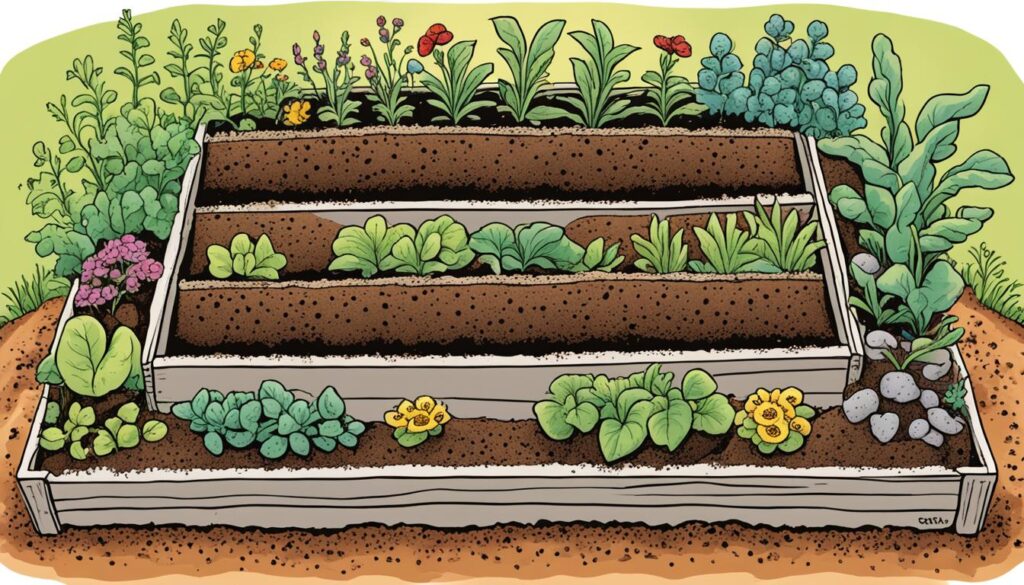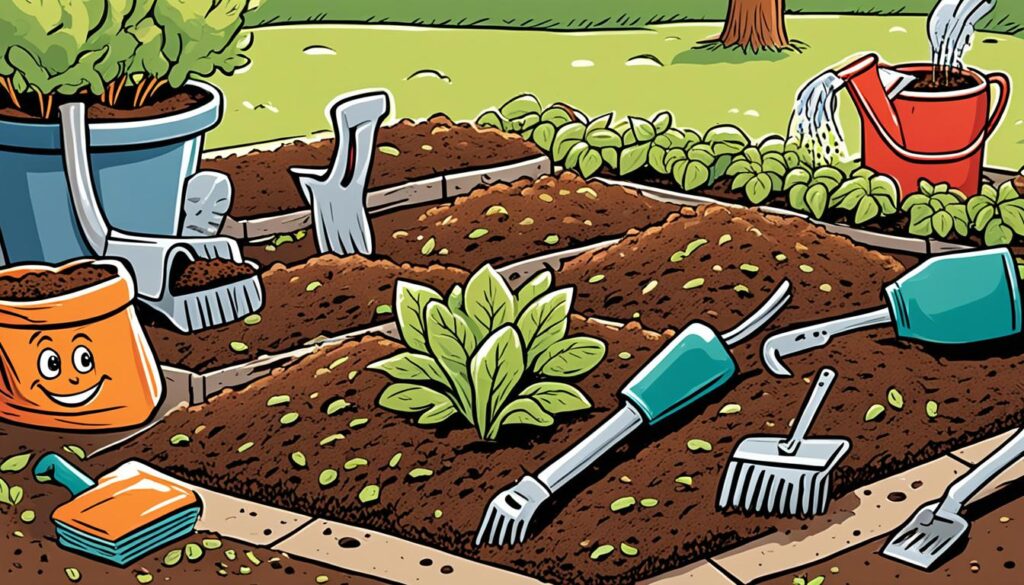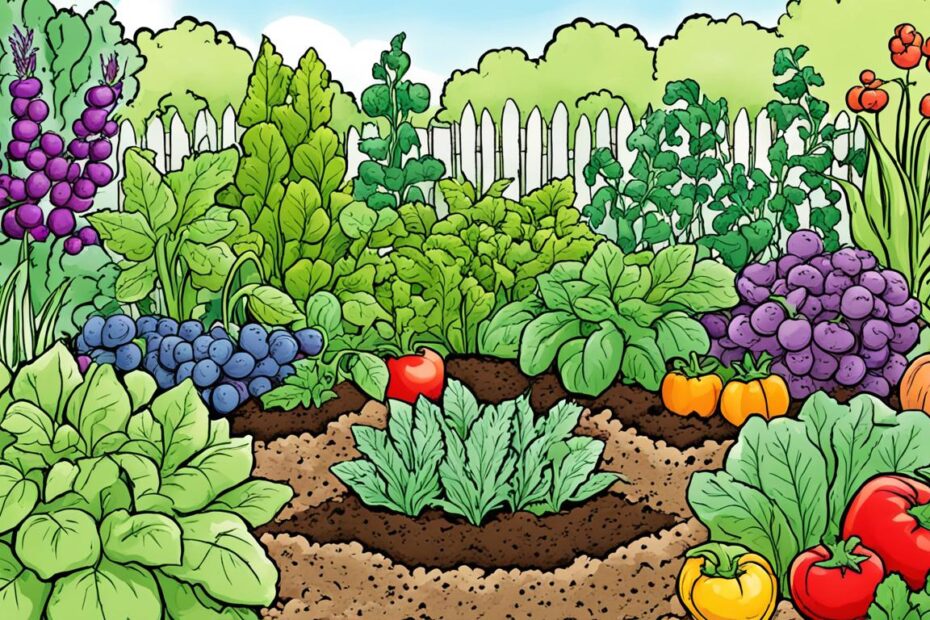Are you looking to take your gardening to the next level? Do you want to boost your plant growth, increase yields, and create a thriving garden? Then it’s time to discover the secret to success: Kellogg Garden Soil.
But what makes Kellogg Garden Soil so special? How can it help you achieve unparalleled results in your garden? Get ready to unearth the answers as we explore the benefits of Kellogg Garden Soil and how it can transform your raised bed gardening experience.
Key Takeaways:
- Kellogg Garden Soil is the key to elevating your gardening experience
- It provides essential nutrients and reduces soil compaction
- Garden Soil promotes robust root systems and improved soil composition
- Raised Bed Soil is formulated specifically for raised beds
- It provides nutrient-rich soil, ideal pH levels, and excellent drainage
The Benefits of Garden Soil
Garden Soil is specially cultivated to create an optimal environment for in-the-ground gardening. It enriches native soil with beneficial nutrients, promotes robust root systems, and improves soil composition. It also reduces compaction and improves moisture retention, resulting in better plant growth and more substantial yields.
Garden Soil is a game-changer for gardeners who want to elevate their harvest. By providing plants with essential nutrients, this specially formulated soil enhances their overall health and vitality. It contains a balanced blend of organic matter, compost, and trace minerals, ensuring that your plants receive the necessary nourishment to thrive.
One of the significant benefits of Garden Soil is its ability to enrich the native soil. When used as a top dressing or mixed into existing soil, it enhances the soil composition, creating an ideal growing environment for your plants. The organic matter in Garden Soil enriches the soil with beneficial nutrients, effectively nourishing your plants from the roots up. As a result, your plants will develop strong, healthy root systems, enabling them to uptake nutrients efficiently and withstand environmental stresses.
Garden Soil also addresses the common issue of soil compaction. Over time, soil can become compacted, restricting root growth and limiting the absorption of water and nutrients. By incorporating Garden Soil into your garden beds, you can break up compacted soil and improve its texture, allowing for better root penetration and nutrient uptake.
Another advantage of Garden Soil is its ability to improve moisture retention. The organic matter in the soil acts as a sponge, absorbing and holding water, while still allowing for proper drainage. This retention of moisture ensures that your plants receive a consistent water supply, reducing the risk of underwatering or overwatering.
Garden Soil is a versatile option that can be used in various gardening applications. Whether you are starting a new garden bed or rejuvenating an existing one, Garden Soil is an excellent choice for improving plant growth and optimizing yield. Its benefits extend beyond the garden season, as the improved soil composition and nutrient content enhance the overall health of your garden for years to come.
Invest in Garden Soil, and watch your garden flourish with the abundance it deserves.
“Garden Soil is a game-changer for gardeners who want to elevate their harvest.”
The Key Benefits of Garden Soil:
- Enriches native soil: Garden Soil enhances the soil composition by enriching it with beneficial nutrients and organic matter.
- Promotes robust root systems: The nutrients in Garden Soil promote healthy root development, which leads to stronger and more productive plants.
- Improves soil composition: By incorporating Garden Soil, you can improve the overall structure and texture of your soil, allowing for better root penetration and nutrient uptake.
- Reduces compaction: Due to its organic composition, Garden Soil helps loosen compacted soil and improve drainage, ensuring optimal growing conditions.
- Enhances moisture retention: The organic matter in Garden Soil acts as a sponge, absorbing and holding water, providing plants with a consistent water supply.
- Versatile and long-lasting: Garden Soil can be used in various gardening applications, rejuvenating your garden beds and sustaining plant health for years to come.
The Benefits of Raised Bed Soil
Raised Bed Soil is the perfect choice for filling your raised beds. It is rich in organic nutrients, such as poultry meal, kelp meal, and worm castings, which feed the soil and promote healthy plant growth. Raised Bed Soil is pH balanced, ensuring optimal conditions for your plants. Additionally, it provides well-draining soil, necessary for container and raised bed gardening.
When it comes to growing plants in raised beds, the quality of the soil is crucial. Raised Bed Soil offers a variety of benefits that contribute to the success of your garden.
Nutrient-Rich Soil for Plant Health
Raised Bed Soil is specially formulated to be nutrient-rich, providing your plants with essential elements for growth. The organic nutrients, such as poultry meal, kelp meal, and worm castings, nourish the soil and create a fertile environment. These natural ingredients are a sustainable alternative to synthetic fertilizers, ensuring the health and vitality of your plants.
Ideal pH Levels for Optimal Growth
The pH balance of the soil plays a crucial role in plant growth. Raised Bed Soil is designed to have an ideal pH level, creating the optimal environment for your plants to thrive. Maintaining the correct pH balance ensures that your plants can absorb nutrients efficiently, leading to healthier growth and increased yields.
Well-Draining Soil for Healthy Roots
Proper drainage is essential for plants in raised beds. Raised Bed Soil provides well-draining soil, preventing waterlogged roots and promoting healthy root development. This well-draining property allows excess water to flow away, reducing the risk of root rot and other water-related plant diseases. It also helps to prevent soil compaction, allowing roots to easily penetrate the soil for better nutrient absorption.
With its nutrient-rich composition, ideal pH balance, and excellent draining properties, Raised Bed Soil creates the perfect growing environment for your plants. Whether you are growing vegetables, flowers, or herbs, using Raised Bed Soil in your raised beds will enable you to achieve optimum results.
| Benefits of Raised Bed Soil |
|---|
| Rich in organic nutrients |
| Ideal pH balance |
| Well-draining soil |

Building Healthy Soil for Raised Beds
Building healthy soil is paramount when constructing your raised beds. The quality of your soil directly impacts the health and productivity of your plants. By implementing proper construction techniques and incorporating organic materials, you can create an ideal environment for your garden to thrive.
Level and Secure Bed Construction
When building your raised beds, it is essential to ensure they are level and secure. Leveling the bed surface not only prevents water runoff but also promotes proper drainage. Securely anchoring the bed walls prevents bowing and maintains structural integrity.
Creating a Diverse Soil Food Web
One of the keys to a healthy soil ecosystem is promoting a diverse soil food web. Microorganisms, beneficial fungi, and earthworms work harmoniously to break down organic matter, releasing essential nutrients for plant uptake. Incorporating compost, cover crops, and mulch into your raised bed soil fosters a thriving soil food web.
“A diverse soil food web improves soil structure, promotes nutrient cycling, and boosts overall soil health.”
The Importance of Organic Materials
Organic materials are vital for nourishing your raised bed soil. They provide essential nutrients, improve soil structure, and enhance microbial activity. Common organic materials include compost, aged manure, and leaf mold. These materials enrich the soil for long-term fertility.
| Organic Materials for Raised Beds | Benefits |
|---|---|
| Compost | Increases nutrient content, improves soil fertility |
| Aged Manure | Enhances soil structure, adds beneficial microbes |
| Leaf Mold | Retains moisture, improves soil aeration |
Properly Nurturing Your Soil
It is essential to continually nurture your raised bed soil to maintain its health and fertility. Regularly add compost or organic amendments to replenish nutrients and enhance microbial activity. Avoid the use of synthetic fertilizers as they can disrupt the delicate balance of the soil food web.
By implementing these practices, you can create a thriving soil environment in your raised beds, promoting robust plant growth and a bountiful harvest.
CLICK HERE TO CHECK OUR RECOMMENDED PRODUCTSConstructing Your Garden Soil
To build healthy garden soil, it is essential to incorporate a diverse blend of organic materials. Your soil is a crucial investment that forms the foundation for your plants’ health and ultimate success. By using a combination of organic materials, you can create a nutrient-rich environment that promotes robust growth and high yields.
When filling your raised beds, it is highly recommended to mix the ingredients thoroughly. This ensures that the organic materials are evenly distributed, providing a balanced blend of nutrients throughout the soil. Mixing the soil also helps prevent any pockets of nutrient imbalance and aids in achieving optimal results.
Nurturing Your Soil
Building great soil is a process that requires time and nurturing. As you construct your garden soil, consider incorporating the following organic materials:
- Compost: Compost adds organic matter and beneficial microorganisms to the soil, enhancing its structure and fertility.
- Manure: Well-aged manure is rich in essential nutrients and acts as a natural fertilizer.
- Peat Moss: Peat moss improves soil structure, water retention, and aeration, creating an ideal growing environment.
- Leaf Mold: Leaf mold increases soil organic matter content, improves moisture retention, and enhances nutrient availability.
- Coco Coir: Coco coir is a sustainable alternative to peat moss, providing excellent water retention and aeration properties.
Remember, healthy soil leads to healthy plants. Take the time to nourish and care for your garden soil, and you’ll reap the rewards of vibrant and thriving plants.
A well-constructed garden soil, enriched with organic materials, creates an inviting habitat for beneficial organisms and promotes the soil food web. This ecosystem of microorganisms, worms, and other soil-dwelling creatures enhances soil fertility, nutrient cycling, and pest control, ensuring the long-term health of your plants.
| Benefits of Constructing Your Garden Soil |
|---|
| Enhanced nutrient availability |
| Improved soil structure and aeration |
| Increased water retention |
| Promotion of healthy root development |
| Support for beneficial soil organisms |

By investing time and effort into constructing your garden soil using organic materials, you create the foundation for a thriving garden. Remember to provide ongoing care and maintenance to ensure the long-term health of your soil and the success of your plants. Happy gardening!
CLICK HERE TO CHECK OUR RECOMMENDED PRODUCTSTips for Bed Construction and Soil Maintenance
Proper bed construction and soil maintenance are crucial for the success of your garden. Follow these tips to ensure your raised beds are built to last and your soil remains fertile.
1. Level the bed surface
Before filling your raised bed with soil, ensure that the surface is level. This will prevent any water pooling and allow for even distribution of nutrients throughout the bed.
2. Use screws for stability
When constructing your raised bed, opt for screws instead of nails. Screws provide greater stability, ensuring that your bed stays intact even during heavy rainfall or strong winds.
3. Consider wall support
If you have tall raised beds, consider adding support to the walls. This can prevent bowing and prolong the lifespan of your bed, allowing you to enjoy a flourishing garden for years to come.
4. Prevent burrowing pests with chicken wire
To keep burrowing pests such as gophers and moles at bay, line the bottom of your raised bed with a layer of chicken wire. This will act as a barrier, protecting your plants and their roots.
5. Avoid using weed cloth
While it may seem like a convenient solution, using weed cloth in your raised beds can hinder drainage and airflow, leading to waterlogged and suffocated plants. Instead, manually remove weeds and focus on maintaining optimal soil conditions.
6. Focus on feeding the soil
Instead of solely focusing on feeding the plants, prioritize nurturing the soil. Adding organic matter, such as compost or aged manure, helps improve soil fertility and promotes a healthy soil ecosystem for your plants to thrive.
| Tip | Description |
|---|---|
| Level the bed surface | Ensure an even surface for proper drainage and nutrient distribution. |
| Use screws for stability | Choose screws over nails to provide long-lasting stability in your raised bed. |
| Consider wall support | Support the walls of tall raised beds to prevent bowing and maintain longevity. |
| Prevent burrowing pests with chicken wire | Line the bottom of your raised bed with chicken wire to deter pests from damaging your plants. |
| Avoid using weed cloth | Abstain from using weed cloth to promote proper drainage and airflow in your raised bed. |
| Focus on feeding the soil | Nurture the soil with organic matter to maintain its fertility and support plant growth. |
Conclusion
Elevate your garden to new heights by incorporating Kellogg Garden Soil in your raised beds. With this high-quality soil, you can transform your gardening space into a haven for bountiful and vibrant plants. By providing optimal conditions and building healthy soil, your raised bed garden will thrive and yield impressive results.
Raised bed gardening offers several benefits, including improved soil drainage, better moisture retention, and enhanced nutrient availability for your plants’ roots. Kellogg Garden Soil provides the essential nutrients and organic matter needed to nourish your plants from the ground up, ensuring their growth, health, and productivity.
Investing in the proper soil and following the recommended bed construction and maintenance practices are integral to the success of your raised bed garden. By creating a strong foundation and nurturing your soil, you are setting the stage for the thriving garden of your dreams.
So, whether you’re a seasoned gardener or a beginner, take your gardening journey to new heights with Kellogg Garden Soil in your raised beds. Witness the incredible transformation and enjoy the rewards of successful raised bed gardening.
FAQ
What is the difference between Garden Soil and Raised Bed Soil?
Garden Soil is enriched with compost and organic matter, providing beneficial nutrients and reducing soil compaction. Raised Bed Soil, on the other hand, is formulated specifically for raised beds, providing nutrient-rich soil, ideal pH levels, and excellent drainage.
How does Garden Soil improve plant growth?
Garden Soil enriches native soil with beneficial nutrients, promotes robust root systems, improves soil composition, reduces compaction, and improves moisture retention, resulting in better plant growth and more substantial yields.
What are the benefits of Raised Bed Soil?
Raised Bed Soil is rich in organic nutrients, such as poultry meal, kelp meal, and worm castings, which feed the soil and promote healthy plant growth. It is pH balanced, ensures optimal conditions for your plants, and provides well-draining soil, necessary for container and raised bed gardening.
How should I construct my raised beds?
To build healthy soil, level and secure your raised beds with a level soil surface to prevent erosion. Adding support to the bed walls can prevent bowing. Incorporate organic materials and promote a diverse soil food web to create a healthy soil environment.
How do I build healthy garden soil?
Mix organic materials to create a diverse blend and invest in quality soil. It is recommended to mix the ingredients well when filling your raised beds for optimal results. Building great soil is a process that takes time and nurturing.
How do I maintain my raised bed and soil?
Proper bed construction and soil maintenance are essential. Level the bed surface, use screws for stability, and consider wall support. Adding a layer of chicken wire can prevent burrowing pests. Avoid using weed cloth, as it hampers drainage. Focus on feeding the soil instead of the plants to maintain soil fertility.
How can Kellogg Garden Soil enhance my raised bed gardening experience?
Elevating your garden with Kellogg Garden Soil in raised beds can transform your space, leading to a bountiful and vibrant yield. By building healthy soil and providing optimal conditions for your plants, you can enjoy the benefits of successful raised bed gardening.
